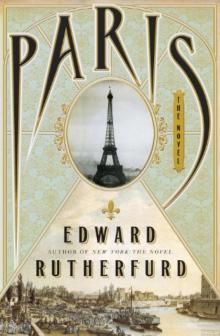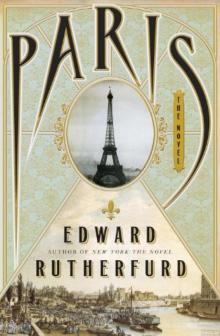- Home
- Edward Rutherfurd
Paris Page 25
Paris Read online
Page 25
The food was good. They began with oysters, accompanied by a glass of champagne. Then turkey with chestnut stuffing, and boudin pudding, with which a red bordeaux was served. The old folk were given just a glass, but Ney indicated to Thomas that he should fill his own glass as much as he pleased. As for Édith’s mother, she needed no bidding, and it was clear that on this occasion at least, Aunt Adeline and Monsieur Ney were content to let her drink as much as she liked, on the premise that she would soon enough fall asleep.
Once, it seemed that Édith’s mother wanted to rise to propose a toast, but Aunt Adeline gave her such a look that, flushed though she was, she kept quiet.
“An excellent meal, madame,” Thomas offered quickly.
“That’s for sure,” she said.
Then came the highlight of the feast, the Christmas cake. Not the heavy fruitcake that the English favored, but the light sponge covered in thick, chocolate butter cream, and rolled into a cylinder. Here Monsieur Ney had outdone himself. He had gone to one of the best patisseries in Paris, and bought a cake that stretched halfway down the long table. The Genoise sponge was golden, the thick spiral of filling in each slice was of chocolate flavored with chestnut. The outside was dusted with powdered sugar.
“The patissier has invented a charming name for the cake,” Monsieur Ney told them. “He calls it a Yule log—bûche de Noël.”
By the end of the meal, everyone was satisfied. Ney, like a monarch who knows that his people will be obedient if they are entertained from time to time, was surveying the room with a look of calm benevolence on his narrow face. The old folk, sleepy and contented, were taken back to their rooms, with Thomas helping, while the table was cleared.
Édith and Margot the nurse appeared, having completed the feeding of the other residents in their rooms. Two places had been set for them at the empty table, and their food, kept warm in the kitchen, was set out under covers. Monsieur Ney thanked them both for their efforts, and left them with a bottle of wine before departing to his own house. Aunt Adeline retired to her quarters with Édith’s mother, who was already half asleep. And Thomas joined Édith and old Margot at the table.
Margot ate stolidly and in silence. Édith poured wine for herself, and for Thomas.
“I’ve drunk too much already,” he said.
“Keep me company.” She smiled.
He watched her. She had grown her hair out in the last few weeks. Instead of being frizzed, it was fuller now, with soft curls just above her shoulders and a part near the middle. Her face was perhaps a little fuller too.
More than ever, he found her desirable. It hadn’t been appropriate to bring his capotes anglaises to Monsieur Ney’s Christmas feast, but he hoped that before too long he might get the chance to use them.
Did she have the same feelings for him? He thought she did. After all, she went out with him, and let him kiss her, and asked him to the Christmas feast. But she was still cautious about letting her feelings show. She held back.
When Margot had finished eating, she waddled off to the kitchen, leaving them to sit and talk. They finished the bottle of wine. Édith added a little water to her wine, so he was actually drinking more, and on top of what he’d already had, he felt pleasantly flushed. She put her hand on his arm.
“You’ll have to go soon,” she said. “I’ll have work to do at the end of the afternoon, and I need a little rest.”
“That’s all right.”
“Thank you for coming. I’m glad you came.” She got up to take the remaining things to the kitchen. He stood to help her. “Stay here,” she said.
A couple of minutes later she returned.
“My mother’s asleep, of course, but even Aunt Adeline’s nodded off.” She sat down beside him and he kissed her, but it wasn’t very satisfactory in the upright chairs.
“I’d better rest,” she said.
“All right.” He stood. “By the way,” he said, “have they found a replacement for Madame Govrit yet?”
“No.” Édith shook her head. “That may take time. Monsieur Ney will want a very special person for that room. You know, Mademoiselle Hortense has already redecorated it.” She smiled. “Do you want to see it before you go?”
“Certainly.”
She led him out into the hall and up the main stairs. One of the steps gave a noble creak as they passed.
“Here we are,” she said, as she opened the door.
He recognized the bed, the armoire and the pictures, which were the same as before. But the paneling had all been repaired and painted. The bed had a new cover, very handsome, in heavy damask, and in front of the fire a small Second Empire sofa with a curved back, upholstered in the same material, had appeared. On the mantel over the fire there was now an ormolu boudoir clock whose dial was held by two gold cherubs; and to the left and right of it, a pair of pretty porcelain figures from the court of Louis XVI. There was a new rug on the floor. Together with the little rococo desk by the window, it all made a charming if slightly predictable ensemble.
It had all been accomplished so quickly, Thomas wondered if some of these items might have come from the lawyer’s house, perhaps from the room of Mademoiselle Hortense herself.
“As you see,” Édith remarked cheerfully, “it’s all ready to be shown off. We have a vase for flowers, when somebody comes to see it.”
He nodded. The room was clearly ready for another Mademoiselle Govrit de la Tour. Feminine. Perhaps even sensuous.
As Édith closed the door, she gave him a funny look.
“You could kiss me if you like,” she said. And he was just moving to do so when she went to the bed, pulled back the damask cover and lay on top of the blankets. “Only a kiss,” she reminded him.
But half an hour later they were still there, with fewer clothes on. Thomas was wishing he had brought those capotes anglaises, only he’d never thought things would turn out like this. Then Édith got up, because she didn’t dare use the sheets, and fetched a towel from the armoire and spread it on the bed and said, “You must be careful.”
And Thomas kissed her and held her and said, “I’ll be gentle. Just tell me if it hurts.”
But Édith smiled and said that he didn’t have to worry about that, and when he looked surprised, she said it was nothing important and a long time ago. And Thomas realized it was too late for him to think much about that now.
A little time passed. And then she cried, “Oh, you mustn’t,” but it was too late.
During the first two months of 1889, the Eiffel Tower raced toward completion. The progress was astounding. By March, it soared to over nine hundred feet, where the third and final platform was being constructed. Enclosed by glass, this observation platform would offer the astonished visitors a panoramic view with a radius, on a clear day, of thirty-five miles—northward to the lovely park of Chantilly, southward to the great Forest of Fontainebleau, and on its western side, far over Versailles and almost to the twin spires of Chartres Cathedral. The whole tower was being painted a bronze color, gradually getting paler as the tower grew higher to increase its appearance of soaring elegance.
The greatest difficulty in these later stages was the installation of the elevators. For though there were stairs that went all the way up to the top, few people would care to mount 1,665 steps—and descend them again.
This work had to be subcontracted, and several companies were tried. But the task was almost beyond them, and they could hardly be blamed. Never before had they been asked to take such huge numbers of passengers up to such unheard-of heights. The elevators taking passengers the 550 feet from the second platform to the top posed less of a problem. But how to raise an elevator that was to travel from the ground, nearly 400 feet to the second platform, on tracks with a variable curve?
In the end, two systems were used for the four feet of the tower. French engineers supplied two inventively designed chain elevators that at least got people from the ground to the first platform. But the American Otis Elevator Company had invented a brilliantly
contrived system, part hydraulic elevator, part railroad, that took passengers up the other two legs of the tower, and continued all the way up to the second platform.
Thomas would tell her enthusiastically about all that was happening.
“Monsieur Eiffel says the Otis elevator designs will be years ahead of the French. But we mustn’t say so,” he confided. “When the gallery is completed up at the top, they’re building a private office for Monsieur Eiffel above it. He says that’s going to be his office for the rest of his life. Imagine it: working each day up in the clouds like that, like a god.”
If Thomas loved his work, Édith thought, so much the better. And if he worshipped Monsieur Eiffel, there was no harm in that. “Just think,” he’d often remind her, “very soon, my name will be painted up there on the tower, because I helped to build it.”
Sometimes, during these weeks, Édith would walk over to the Trocadéro before she went to work in the lycée and gaze into the sky where Thomas was working. If the day was misty, she might not be able to see the upper part of the tower at all. More often, under a blanket of cloud, and through the smoke from a thousand chimneys, she would see a faint hint of firelight in the sky as the rivets were heated on their little braziers high in the girders. But sometimes, if the sky was clear, she would see those same braziers twinkle like stars, and smile, wondering if Thomas was standing with his hammer beside one of them.
They had not made love again after Christmas Day. He had wanted to. “I have protection,” he had told her. But she had been reluctant. “Not just yet,” she had told him, several times. He’d been rather hurt and frustrated, and she knew that her refusal made no sense. But for reasons she could not explain, she did not want to give herself to him again. Not yet. Not until she had decided what to do.
It was in mid-January that she had started to get alarmed. But she hoped she might be wrong, and she told nobody. By mid-February, there could be no doubt. It was useless to talk to her mother, but she went to see Aunt Adeline.
“Idiot!” her aunt cried. “When?” And when Édith told her the when and where, “You’re insane. And he took no precautions?”
“We weren’t planning to. It just happened.”
“Have you told him?”
“No.”
“Why?”
“Because he’d want to have the child and get married. I know him.”
“Ah.” Aunt Adeline considered. “Faced with the reality, he might not be so keen.”
“No. It’s his character.”
“Do you love him?”
“He looked for me all over Paris, for a year. I couldn’t believe it, but it’s true. And since he found me, he’s never given up.”
“I didn’t ask if he loved you. I asked if you loved him.”
“He’s nice with me. He’s considerate. He tries to please me. And he’s honest. I like that. And I find him seductive. I want him when he’s there.”
“He has no money.”
“I can’t complain. Nor have I.”
“We’ll try to get you a little. You know that I think you can do better.”
“People with a little money like to find other people with a little money too. Maybe rich people marry who they like.”
“No, they don’t. Their families see to that.”
“He’s loyal. At least I don’t think he’d walk out on me like my father.”
Aunt Adeline was silent for a moment. Then she said:
“I don’t want to tell Monsieur Ney. He wouldn’t be pleased at all.” She considered. “Perhaps I could arrange for you to go away for a while. You could have the child. But we’d have to give the child up for adoption. Nobody need be any the wiser. That’s one alternative.” She looked sadly at Édith. “Or, I know a doctor who could take care of it …”
“I’m afraid of that.” Édith shook her head. “It can be dangerous.”
“You know, my child, that if you have the child and keep it, you have no chance of making a respectable marriage, don’t you? Unless you marry this boy. But I foresee a life of poverty.”
“I know. I need to think.”
“Well, don’t think for too long. It’ll show in a while.”
“I feel as if it does already.”
“That’s just your imagination. But during the spring …”
And now March had begun, and still Édith hadn’t decided what to do. Nor had she told Thomas.
Édith didn’t often think about her father. The truth was, she hardly remembered him. But she knew what he looked like. Her mother had no picture of him, but Aunt Adeline did. The picture showed quite a handsome-looking man. His hair appeared to be the same dark color as Aunt Adeline’s, but where hers was neatly pulled back, his was shaggy. There was something boyish about him. He was wearing a jacket, but his shirt was open at the collar. He looked like what he was, an intelligent workingman, a builder, Aunt Adeline said.
Had he left because his wife was a foolish drinker, or had she got that way because he left? Édith suspected it was the latter, but she wasn’t sure, and Aunt Adeline would never discuss it. Where had he gone? “Who knows?” her aunt would say with a shrug.
Sometimes Édith would imagine that Aunt Adeline did know where her father was and that she was keeping it a secret. Perhaps he did not want to live with her mother. Perhaps there was some other trouble that he had to hide. Perhaps he was in prison. But she liked to think that, wherever he was, he cared about her. She pictured him asking Aunt Adeline for reports of her, and listening to them eagerly. He might know all about her. He could even be secretly watching her sometimes as she walked down the street—watching her with love and pride. It was possible. You never knew. She realized that these were childish fantasies, but she could not help it if, when she was in her bed all alone at night, she sometimes allowed herself to dream of such things before she went to sleep.
Lately, she had been thinking of her father more often. And she compared in her mind the feelings of warmth that these foolish dreams brought her with the feeling of warmth and comfort she experienced when she was with Thomas, and he put his strong arms around her, and held her. And sometimes when she thought of him like that, she thought she would tell him about the baby growing within her, and sometimes she wasn’t so sure. But she was beginning to think that perhaps she would.
So when he suggested that they meet Pepe and Anna on Sunday, because Pepe had discovered an Irish bar where you could eat cheaply—he was always inventive like that—she’d agreed, thinking that maybe at the end of the day, when she and Thomas were walking back together, she might tell him her secret.
They met at the Irish bar in the middle of the day. It was on the edge of the Saint-Germain quarter near the old Irish College. The two young men were especially pleased with themselves because their crew had been among the last twenty men working at the top of the tower. This was a special badge of honor.
Pepe insisted they all drink the dark Irish Guinness with their meal, which they were not used to. Then they drank some red wine. Thomas amused them all by confessing how he’d sworn to Monsieur Eiffel that he had an excellent head for heights, and then frozen with panic before the building even got to the first platform. Anna told them stories about her huge family in Italy. By the time they were finally ready to leave, they were all very happy, but a little tipsy.
They strolled back together, along the left bank of the Seine. The tower, virtually completed, rose into the blue sky ahead of them. They reached the great site, where numerous halls were already being prepared for the huge exhibition. Some way off, there were people on the bridge staring up, but the fenced-off site was empty.
And they were just about to go their separate ways when Pepe said: “And now, Thomas and I will give you a demonstration of the fearless flyers of the Eiffel Tower.”
He led them to a small gap in the fence and in another minute they were in the quiet space under the huge southern archway of the tower.
“Want to come up?” he asked the gir
ls.
“No,” said Édith. “Anyway it’s all locked.”
But Pepe only laughed.
“Come on, Thomas,” he cried. “Let’s go.”
Édith stared in horror. It suddenly occurred to her: If anything were to happen to Thomas, now of all times …
“Stay here. Thomas,” she begged him. “Don’t go up. You’ve been drinking.”
“We’re not drunk,” Pepe cried. “They give us wine up the tower every day.”
“Please, Thomas,” she implored.
But the two men were already swarming up the huge framework. After a while they got into the stairs. She and Anna could see them running happily up them, laughing as they went. Then, for a short while, they couldn’t be seen.
“Where do you think they are?” she asked Anna.
“Perhaps they’re going to the top,” Anna suggested.
“Oh my God, don’t let them do that,” Édith prayed. She looked up the huge iron network reaching into the sky. The safety barriers were all gone now. There was nothing to protect anyone out there on the girders. She still couldn’t see them. She and Anna moved in closer, almost under the arch.
Then, somewhere up there, she heard Thomas’s voice calling down.
“Édith! Can you see me?” And then, just behind the huge arch under the first landing, she saw him balanced on a girder.
“Yes. But take care,” she cried.
“It was here exactly. This is where I panicked.”
“Are you all right?”
“But of course.” He waved.
“Where’s Pepe?” called Anna.
There was a brief silence. Then Pepe’s voice floated down to them.
“Anna. Look to the left of Thomas.”
He was on a beam, a little higher, standing very comfortably with his hands on his hips, and staring down at them as if he owned the place.
Édith called out to them both that they should come down now or someone would see, and they’d all get into trouble. Reluctantly, Thomas moved to one side, and she could see him getting near the stairs. But Pepe hadn’t come in yet. And then, suddenly, he began to sing.

 Princes of Ireland
Princes of Ireland New York
New York Sarum
Sarum London
London Russka: The Novel of Russia
Russka: The Novel of Russia China
China Paris
Paris The Forest
The Forest Russka
Russka The Rebels of Ireland: The Dublin Saga
The Rebels of Ireland: The Dublin Saga The Princes of Ireland
The Princes of Ireland Paris: The Novel
Paris: The Novel